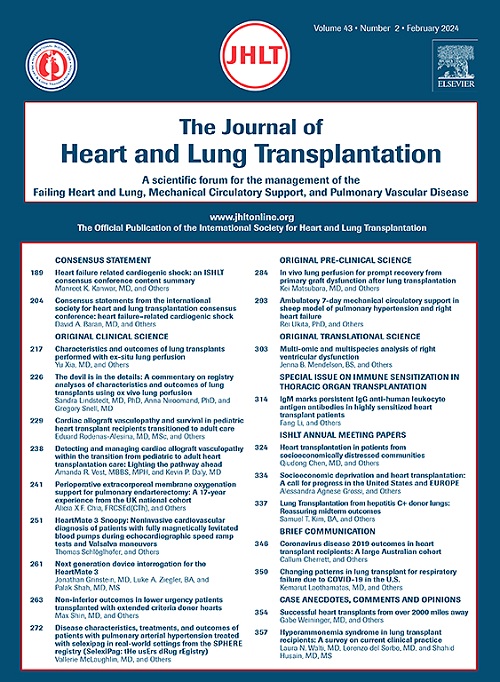Trends in heart transplant outcomes for patients over the age of 70 years in the United States: An analysis of the scientific registry of transplant recipients database
IF 6.4
1区 医学
Q1 CARDIAC & CARDIOVASCULAR SYSTEMS
引用次数: 0
Abstract
Background
Patients of advanced age are often considered to be poor candidates for heart transplant (HT). As the U.S. population continues to age, it is important for clinicians to understand how best to select patients for advanced therapies.
Methods
This was a retrospective analysis of the U.S. Scientific Registry of Transplant Recipients data from 2006 to August 2022 in adult recipients. Patients were excluded if they were multiorgan transplant, re-do transplants, or less than 1 year post transplant.
Results
Recipients ≥70 had a 1-year survival of 87.5%, compared to 91.1% for <60%, and 88.4% for 60–69 years (p < 0.001). Survival improved numerically, but not significantly, as transplant eras progressed for those ≥70 years. Survival by Kaplan-Meier analysis was greatest at 5 years for <60 years (80.6%), compared to 60–69 years (78.2%) and ≥70 years (77.1%). When comparing 60–69 years to ≥70 years by this same metric, there was significant difference (p = 0.12). One year survival for those ≥70 years has improved from 2000–2009 (80.7%) to 88.5% since October 2018 (p < 0.001). As recipients increased in age, they were more likely to be male, and less likely to be Black or Hispanic/Latino (p < 0.001).
Conclusion
Overall, HT outcomes are excellent for carefully selected patients ≥70 years, and transplanting patients in this age cohort can be considered.
美国 70 岁以上患者心脏移植结果趋势:移植受者科学登记数据库分析》。
背景:高龄患者通常被认为不适合心脏移植(HT)。随着美国人口不断老龄化,临床医生必须了解如何最好地选择患者接受晚期治疗:这是一项对美国移植受者科学登记处 2006 年至 2022 年 8 月成年受者数据的回顾性分析。如果患者是多器官移植、再次移植或移植后不足 1 年,则排除在外:结果:≥70岁的受者一年存活率为87.5%,而≥70岁的受者一年存活率为91.1%:总体而言,经过精心挑选的≥70 岁患者的 HT 结果非常好,可以考虑对这一年龄组的患者进行移植。
本文章由计算机程序翻译,如有差异,请以英文原文为准。
求助全文
约1分钟内获得全文
求助全文
来源期刊
CiteScore
10.10
自引率
6.70%
发文量
1667
审稿时长
69 days
期刊介绍:
The Journal of Heart and Lung Transplantation, the official publication of the International Society for Heart and Lung Transplantation, brings readers essential scholarly and timely information in the field of cardio-pulmonary transplantation, mechanical and biological support of the failing heart, advanced lung disease (including pulmonary vascular disease) and cell replacement therapy. Importantly, the journal also serves as a medium of communication of pre-clinical sciences in all these rapidly expanding areas.

 求助内容:
求助内容: 应助结果提醒方式:
应助结果提醒方式:


